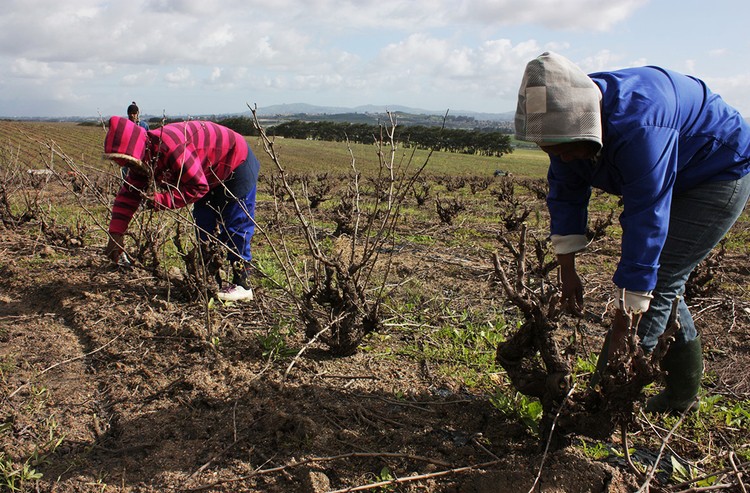UN expert urges tougher action on pesticides in SA
Pesticides which are banned in Europe are still exported to developing countries
Farm workers and their children are exposed to pesticides that have been banned in Europe. These pesticides remain in the environment, and studies have found them all year round in three river catchments in the Western Cape. Archive photo: Steve Kretzmann
- The UN Special Rapporteur has filed a report on the use of pesticides in South Africa.
- His report notes farmworkers and children being exposed to pesticides that are banned in the EU and other countries, which have serious health implications.
- He welcomes government’s plans to bans certain pesticides, but says the Department of Agriculture needs to clamp down harder.
- He expressed concerns about “corporate capture” and “confidential business information” about pesticides.
All hazardous pesticides that have been banned in their countries of origin should also be banned in South Africa, a United Nations expert has recommended.
Marcos Orellana, who is “UN Special Rapporteur on the implications for human rights of the environmentally sound management and disposal of hazardous substances and wastes”, visited South Africa in the second half of 2023. His report, published in July this year, will be submitted to the UN Human Rights Council in September-October.
Orellana said evidence had linked exposure to pesticides to serious effects on the skin, eyes, liver and kidneys, as well as the cardiovascular, endocrine and nervous systems and children and women were especially vulnerable.
In the Western Cape, he said, he had heard from women farm workers who reported being asked to work in the vineyards immediately after pesticides had been sprayed, without being provided with personal protective equipment and while a thick layer of pesticides still covered the grapes.
He said pesticides entered rivers. Quoting a 2020 study, which found very high levels of five pesticides in the Krom River, Berg River and Hex River watersheds in the Western Cape, he said: “Those five pesticides, among others, are banned in the European Union. However, some of them are still produced in European countries for export, particularly to developing countries, a practice that reproduces long-standing racist and colonial patterns of exploitation.”
On Tuesday more than 150 farm workers from the Women on Farms Project marched on the German Consulate-General to demand an end to the export to South Africa of pesticides which are banned in Germany.
Orellana welcomed plans by the Department of Agriculture, Land Reform and Rural Development to ban certain pesticides. But all hazardous pesticides that have been banned in their countries of origin “should also be banned in South Africa,” he said.
Orellana also welcomed improvements to the Fertilizers, Farm Seeds, Seeds and Remedies Act. But, he said, better public participation and mechanisms to trace pesticides were necessary.
He expressed concerns about “corporate capture” and “confidential business information” about pesticides. At the time of the visit, a list of registered pesticides in South Africa could only be accessed through CropLife South Africa, an association representing agrochemical companies, for a fee.
Apart from banning pesticides which are already banned in the countries where they are manufactured, he also recommended that the government
- prohibit aerial spraying;
- ensure sound management and disposal of pesticide containers and stockpiles;
- promote sustainable agricultural practices and small farming;
- outline clear mechanisms for public participation in pesticide registration processes;
- tackle the issue of the backlogs in state toxicology centres;
- enhance labelling requirements to include specifications for buffer zones and non-target areas;
- offer training to farm workers on their legal rights, the dangers of pesticide misuse, safe handling of pesticides and how to read labels;
- make pesticide labels available in more languages, particularly those accessible to farm workers; and
- ensure access to adequate health care for farm workers.
Support independent journalism
Donate using Payfast

Next: “Battered woman syndrome”: law to be challenged
Previous: Proposals to protect penguins would cripple R5.5-billion fishing industry, court told
© 2024 GroundUp. This article is licensed under a Creative Commons Attribution-NoDerivatives 4.0 International License.
You may republish this article, so long as you credit the authors and GroundUp, and do not change the text. Please include a link back to the original article.
We put an invisible pixel in the article so that we can count traffic to republishers. All analytics tools are solely on our servers. We do not give our logs to any third party. Logs are deleted after two weeks. We do not use any IP address identifying information except to count regional traffic. We are solely interested in counting hits, not tracking users. If you republish, please do not delete the invisible pixel.

